Introduction
Surah Rahman, often referred to as the “Adorning One,” is the 55th chapter of the Quran.
It is renowned for its eloquent and rhythmic verses that beautifully describe the abundant blessings and mercy of Allah.
The Surah is a powerful reminder of the countless favors that Allah has granted to humanity and the jinn, urging them to acknowledge and appreciate these divine gifts.
Its recitation is known to bring peace and tranquility to the heart, making it a beloved chapter among Muslims worldwide.
One of the most fascinating aspects of Surah Rahman is the repeated verse, “Which of the favors of your Lord will you deny?” This verse is mentioned 31 times throughout the chapter, serving as a powerful rhetorical question that invites reflection.
The repetition emphasizes the importance of recognizing Allah’s blessings and encourages believers to express gratitude for the countless mercies bestowed upon them.
This unique feature gives the Surah a rhythmic and poetic quality, making its recitation particularly moving and impactful.
Table of Contents

Listen Surah Rahman

Read Surah Rahman Online
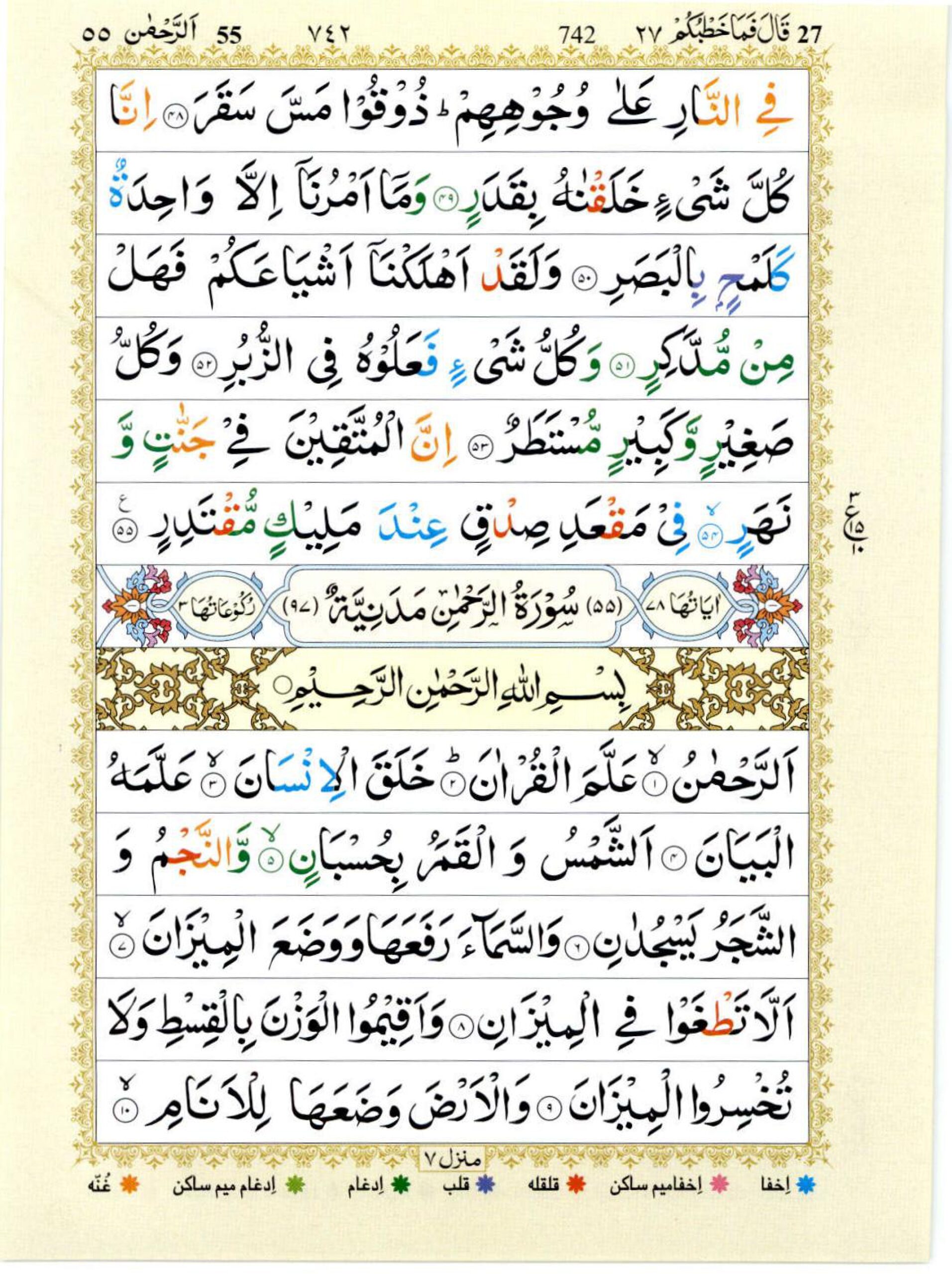
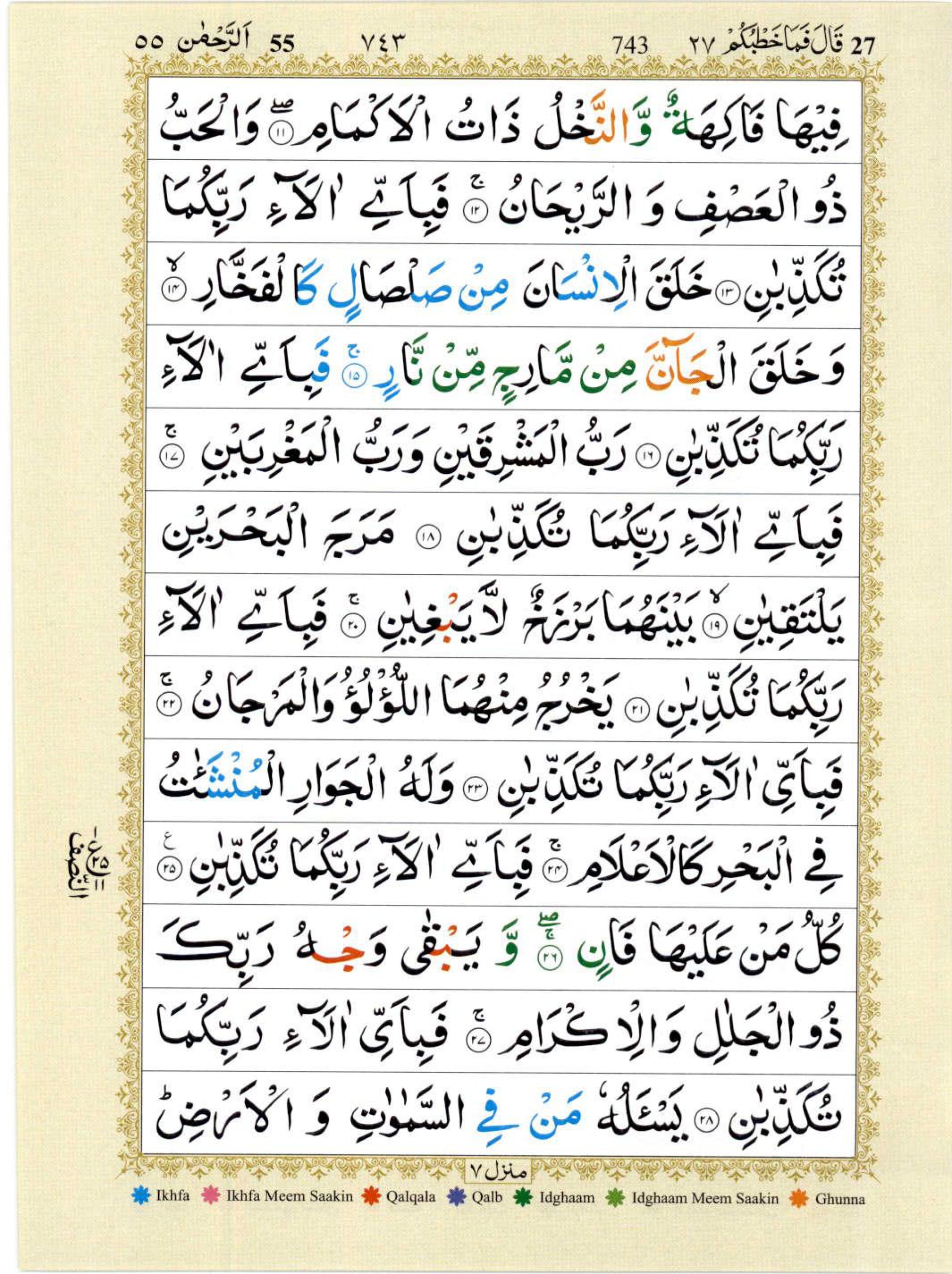
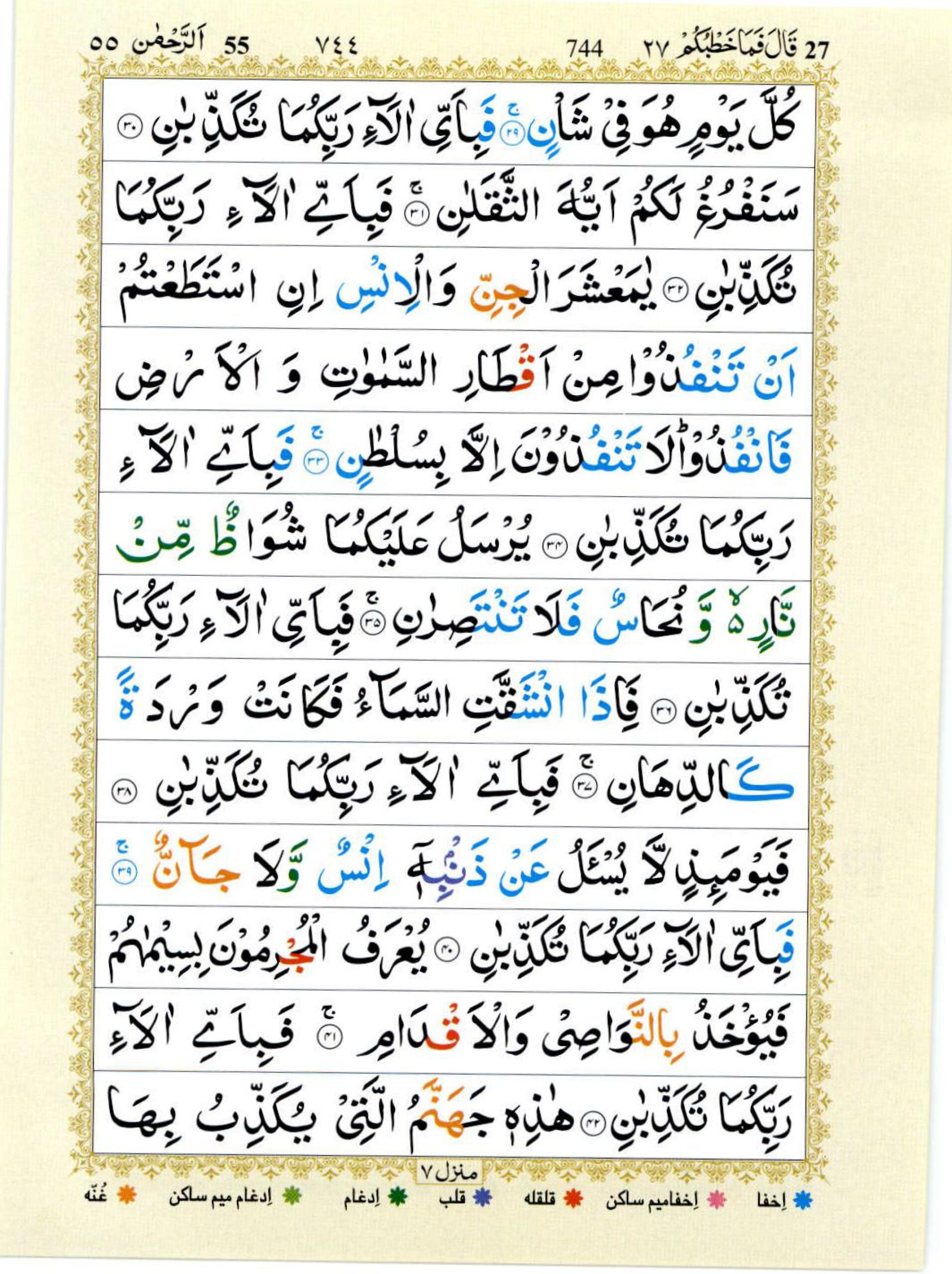
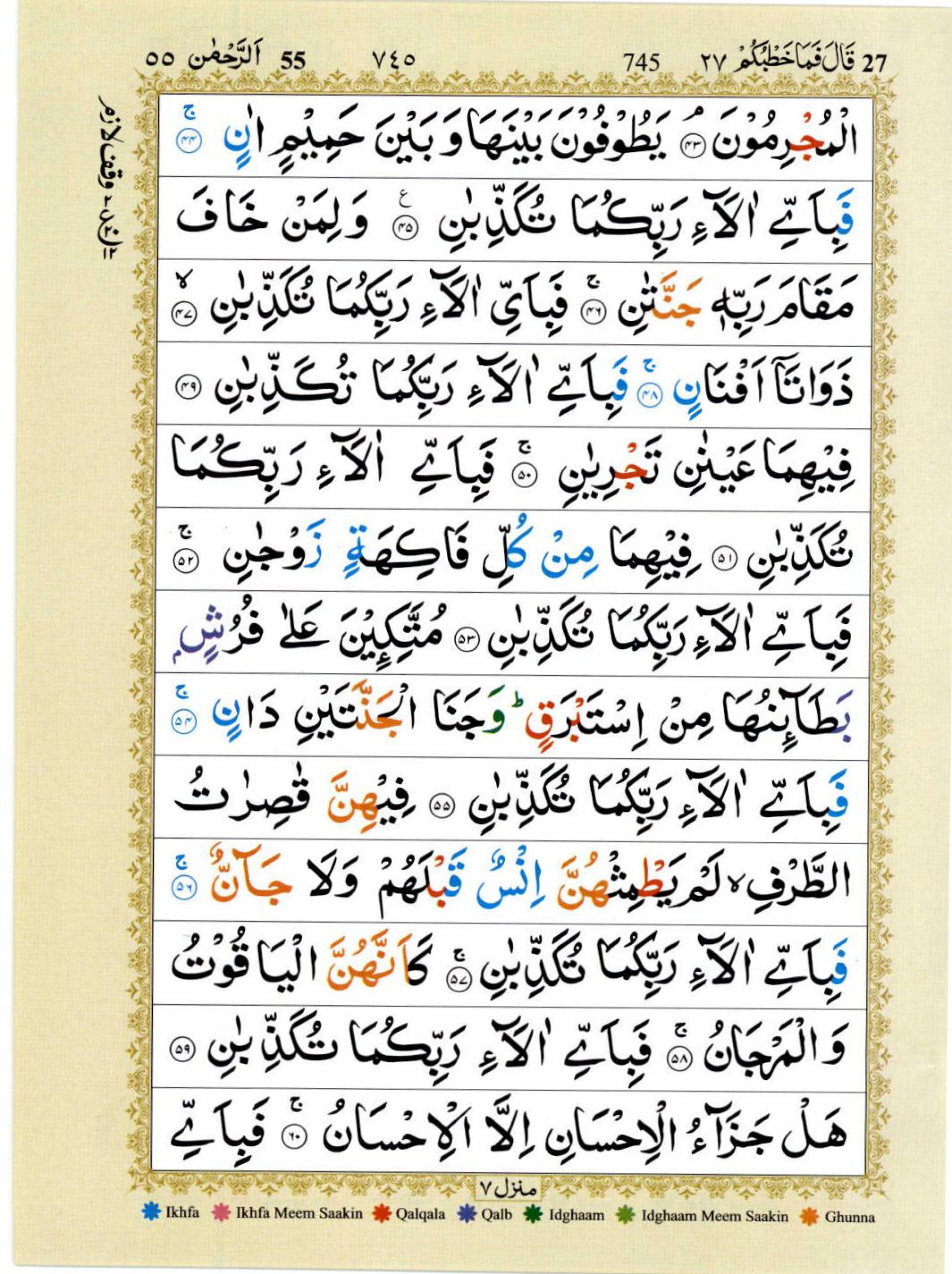
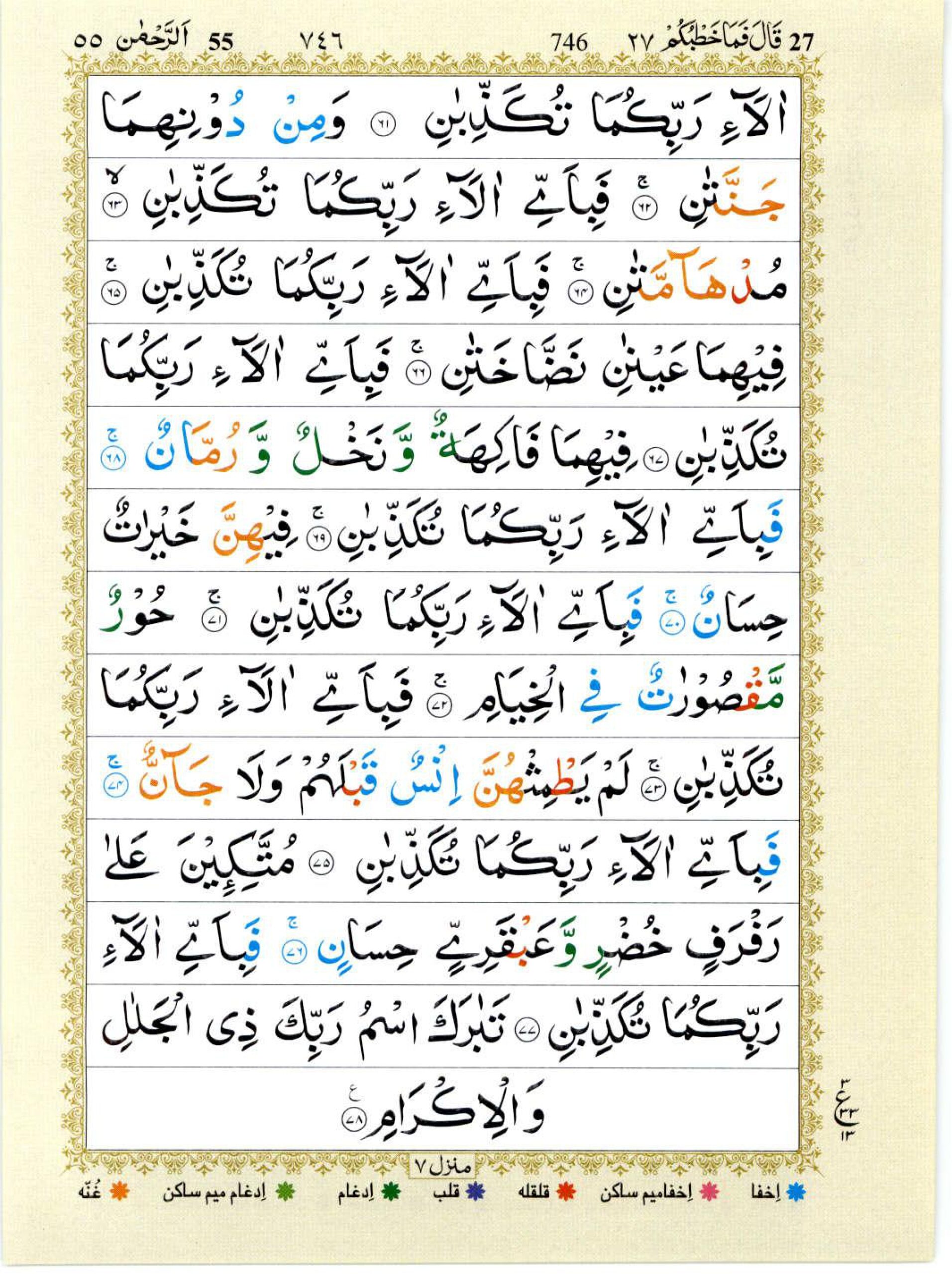

Video: Surah Al-Kahf explanation in English

Verses: Surah Rahman
- Verse 1: The Most Merciful
- Verse 2: Taught the Qur’an,
- Verse 3: Created man,
- Verse 4: [And] taught him eloquence.
- Verse 5: The sun and the moon [move] by precise calculation,
- Verse 6: And the stars and trees prostrate.
- Verse 7: And the heaven He raised and imposed the balance
- Verse 8: That you not transgress within the balance.
- Verse 9: And establish weight in justice and do not make deficient the balance.
- Verse 10: And the earth He laid out for creatures.
- Verse 11: Therein is fruit and date palms having sheaths [of dates],
- Verse 12: And grain having husks and scented plants.
- Verse 13: So which of the favors of your Lord would you deny?
- Verse 14: He created man from clay like [that of] pottery.
- Verse 15: And He created the jinn from a smokeless flame of fire.
- Verse 16: So which of the favors of your Lord would you deny?
- Verse 17: [He is] Lord of the two sunrises and Lord of the two sunsets.
- Verse 18: So which of the favors of your Lord would you deny?
- Verse 19: He released the two seas, meeting [side by side];
- Verse 20: Between them is a barrier [so] neither of them transgresses.
- Verse 21: So which of the favors of your Lord would you deny?
- Verse 22: From both of them emerge pearl and coral.
- Verse 23: So which of the favors of your Lord would you deny?
- Verse 24: And to Him belong the ships [with sails] elevated in the sea like mountains.
- Verse 25: So which of the favors of your Lord would you deny?
- Verse 26: Everyone upon the earth will perish,
- Verse 27: And there will remain the Face of your Lord, Owner of Majesty and Honor.
- Verse 28: So which of the favors of your Lord would you deny?
- Verse 29: Whoever is within the heavens and earth asks Him; every day He is bringing about a matter.
- Verse 30: So which of the favors of your Lord would you deny?
- Verse 31: We will attend to you, O prominent beings.
- Verse 32: So which of the favors of your Lord would you deny?
- Verse 33: O company of jinn and mankind, if you are able to pass beyond the regions of the heavens and the earth, then pass. You will not pass except by authority [from Allah].
- Verse 34: So which of the favors of your Lord would you deny?
- Verse 35: There will be sent upon you a flame of fire and smoke, and you will not defend yourselves.
- Verse 36: So which of the favors of your Lord would you deny?
- Verse 37: And when the heaven is split open and becomes rose-colored like oil .
- Verse 38: So which of the favors of your Lord would you deny?
- Verse 39: Then on that Day none will be asked about his sin among men or jinn.
- Verse 40: So which of the favors of your Lord would you deny?
- Verse 41: The criminals will be known by their marks, and they will be seized by the forelocks and the feet.
- Verse 42: So which of the favors of your Lord would you deny?
- Verse 43: This is Hell, which the criminals deny.
- Verse 44: They will circulate between it and scalding water, heated [to the utmost degree].
- Verse 45: So which of the favors of your Lord would you deny?
- Verse 46: But for he who has feared the position of his Lord are two gardens –
- Verse 47: So which of the favors of your Lord would you deny?
- Verse 48: Having [spreading] branches.
- Verse 49: So which of the favors of your Lord would you deny?
- Verse 50: In both of them are two springs, flowing.
- Verse 51: So which of the favors of your Lord would you deny?
- Verse 52: In both of them are of every fruit, two kinds.
- Verse 53: So which of the favors of your Lord would you deny?
- Verse 54: [They are] reclining on beds whose linings are of silk brocade, and the fruit of the two gardens is hanging low.
- Verse 55: So which of the favors of your Lord would you deny?
- Verse 56: In them are women limiting [their] glances, untouched before them by man or jinni –
- Verse 57: So which of the favors of your Lord would you deny?
- Verse 58: As if they were rubies and coral.
- Verse 59: So which of the favors of your Lord would you deny?
- Verse 60: Is the reward for good [anything] but good?
- Verse 61: So which of the favors of your Lord would you deny?
- Verse 62: And below them both [in excellence] are two [other] gardens .
- Verse 63: So which of the favors of your Lord would you deny?
- Verse 64: Dark green [in color].
- Verse 65: So which of the favors of your Lord would you deny?
- Verse 66: In both of them are two springs, spouting.
- Verse 67: So which of the favors of your Lord would you deny?
- Verse 68: In both of them are fruit and palm trees and pomegranates.
- Verse 69: So which of the favors of your Lord would you deny?
- Verse 70: In them are good and beautiful women –
- Verse 71: So which of the favors of your Lord would you deny?
- Verse 72: Fair ones reserved in pavilions –
- Verse 73: So which of the favors of your Lord would you deny?
- Verse 74: Untouched before them by man or jinni –
- Verse 75: So which of the favors of your Lord would you deny?
- Verse 76: Reclining on green cushions and beautiful fine carpets.
- Verse 77: So which of the favors of your Lord would you deny?
- Verse 78: Blessed is the name of your Lord, Owner of Majesty and Honor.

Virtue: Surah Rahman
1. Mercy of Allah:
Surah Ar-Rahman emphasizes Allah’s mercy, showing that He is kind and compassionate to all creation.
2. Balance in Creation:
The Surah speaks about the perfect balance and harmony in the universe, a sign of Allah’s wisdom.
3. Guidance for Mankind:
It provides clear guidance on how to live a righteous life in accordance with Allah’s will.
4. Reminds of Allah’s Blessings:
The Surah frequently asks, “Which of the favors of your Lord will you deny?” reminding us to be grateful for Allah’s blessings.
5. Creation of Humans and Jinn:
Surah Ar-Rahman explains that both humans and jinn were created to worship Allah.
6. Signs of Allah’s Power:
It describes natural phenomena like the sun, moon, and stars as signs of Allah’s power.
7. Encourages Reflection:
The Surah urges believers to reflect on the wonders of creation and the blessings they receive.
8. Highlights the Day of Judgment:
It vividly describes the Day of Judgment, emphasizing the accountability of all beings.
9. Rewards for the Righteous:
Surah Ar-Rahman promises beautiful gardens and blessings for those who are righteous and obedient to Allah.
10. Warning for the Wicked:
It also warns of the severe consequences awaiting those who reject faith and commit sins.
11. Equality Before Allah:
The Surah highlights that everyone, regardless of status, is equal before Allah and will be judged fairly.
12. Peace and Tranquility:
Reciting Surah Ar-Rahman brings peace and tranquility to the heart.
13. Intercession on the Day of Judgment:
It is believed that Surah Ar-Rahman will intercede for its reciter on the Day of Judgment.
14. Healing:
Many believe that reciting this Surah can bring healing to physical and spiritual ailments.
15. Forgiveness of Sins:
Reciting Surah Ar-Rahman with sincerity is said to lead to the forgiveness of sins.
16. Understanding of the Qur’an:
This Surah helps in understanding the beauty and depth of the Qur’an’s message.
17. Encourages Gratitude:
By repeating the verse about Allah’s favors, it encourages us to always be grateful.
18. Connection with Nature:
Surah Ar-Rahman strengthens the believer’s connection with nature, seeing it as a sign of Allah’s greatness.
19. Hope and Optimism:
The Surah inspires hope and optimism by focusing on Allah’s mercy and the rewards for the righteous.
20. Strengthening Faith:
Regular recitation of Surah Ar-Rahman helps in strengthening one’s faith and reliance on Allah.

Best time to recite
1. Early Morning (Fajr):
Reciting after Fajr prayer for blessings throughout the day.
2. After Fajr Prayer:
For peace and tranquility as the day begins.
3. After Asr Prayer:
For spiritual reflection in the late afternoon.
4. During the Night (Tahajjud):
Reciting during Tahajjud for deeper connection with Allah.
5. Any Time of Need:
Whenever seeking comfort, healing, or forgiveness.
6. Friday (Jumu’ah):
Reciting on Friday is considered especially virtuous.
7. During Illness:
For seeking Allah’s mercy and healing.
8. Before Sleeping:
For peace and protection during sleep.
9. During Difficult Times:
To find solace and strength in Allah’s mercy.
10. Special Occasions:
Reciting during important moments for blessings.

Hadith: Surah Rahman
1. Hadith about Surah Ar-Rahman as the “Bride of the Qur’an”:
It is narrated that the Prophet Muhammad (peace be upon him) said:
“Everything has a bride, and the bride of the Qur’an is Surah Ar-Rahman.”
Reference : This hadith is found in smaller collections like those of Al-Bayhaqi. However, its authenticity is debated among scholars, with some considering it weak
2. Adornment of Qur,an
The Prophet Muhammad (peace be upon him) said, “Everything has an adornment, and the adornment of the Qur’an is Surah Ar-Rahman.”
Reference: Narrated by Al-Bayhaqi.

Stories: Surah Rahman
Surah Ar-Rahman does not tell specific stories like some other chapters in the Qur’an. Instead, it focuses on the following main ideas:
1. Creation:
It talks about how Allah created humans from clay and jinn from smokeless fire, showing the variety in His creation.
2. Nature’s Wonders:
The Surah mentions the sun, moon, stars, and oceans as signs of Allah’s power, asking us to think about these amazing things.
3. Balance in the World:
It explains how Allah made everything in perfect balance, reminding us to be fair and just in our lives.
4. Paradise and Hell:
The Surah describes the beautiful rewards in Paradise for those who do good and the severe punishments in Hell for those who do wrong.
Overall, Surah Ar-Rahman encourages us to be grateful for Allah’s many blessings and to live a life of righteousness.

FAQ: Surah Rahman
1. What is Surah Ar-Rahman?
Surah Ar-Rahman is the 55th chapter of the Qur’an and is known for highlighting Allah’s mercy.
2. Why is it named “The Most Merciful”?
The Surah emphasizes Allah’s boundless mercy and kindness to all creation.
3. How many verses does Surah Ar-Rahman have?
It contains a total of 78 verses.
4. What is the primary focus of Surah Ar-Rahman?
The Surah mainly discusses Allah’s mercy, the marvels of creation, and the Day of Judgment.
5. Which verse is frequently repeated in Surah Ar-Rahman?
The verse “Which of the favors of your Lord will you deny?” appears 31 times.
6. Why is this verse repeated often?
To remind us constantly of Allah’s numerous blessings and to encourage gratitude.
7. What does Surah Ar-Rahman say about creation?
It speaks about the creation of humans and jinn and describes natural wonders as signs of Allah’s power.
8. Does the Surah discuss Paradise and Hell?
Yes, it describes the rewards in Paradise for the good and the punishments in Hell for the wicked.
9. When is the best time to recite Surah Ar-Rahman?
It can be recited anytime, but many choose to recite it after Fajr or Asr prayers, during the night, or in times of need.
10. What are the benefits of reciting Surah Ar-Rahman?
Reciting it brings peace, reflects on Allah’s mercy, and reminds us of His many blessings.
11. Is there a hadith related to Surah Ar-Rahman?
A hadith mentions, “Everything has an adornment, and the adornment of the Qur’an is Surah Ar-Rahman,” though the hadith’s authenticity is considered weak.
12. Why is Surah Ar-Rahman called the “Bride of the Qur’an”?
This title highlights its beauty, though t comes from weaker narrations and is not universally accepted.
13. Can Surah Ar-Rahman be recited for healing?
Many people believe that reciting it can bring both spiritual and physical healing.
14. How does Surah Ar-Rahman describe Allah’s mercy?
It shows Allah’s mercy through creation, the balance in the universe, and the rewards and punishments in the afterlife.
15. Is Surah Ar-Rahman easy to memorize?
Yes, its rhythmic verses and repetition make it easier to memorize for many people
16. What does Surah Ar-Rahman say about balance in creation?
It emphasizes that Allah created everything in perfect balance and harmony.
17. Who can benefit from reciting Surah Ar-Rahman?
Everyone can benefit as it is a reminder of Allah’s mercy and encourages gratitude and reflection.
18. Does Surah Ar-Rahman mention the Day of Judgment?
Yes, it vividly describes the Day of Judgment, reminding believers of their accountability.
19. Why is it important to reflect on Surah Ar-Rahman?
Reflecting on it helps us appreciate Allah’s mercy and the importance of living a righteous life.
20. How can Surah Ar-Rahman impact one’s life?
Regular recitation and reflection can bring peace, strengthen faith, and increase gratitude for Allah’s blessings.

